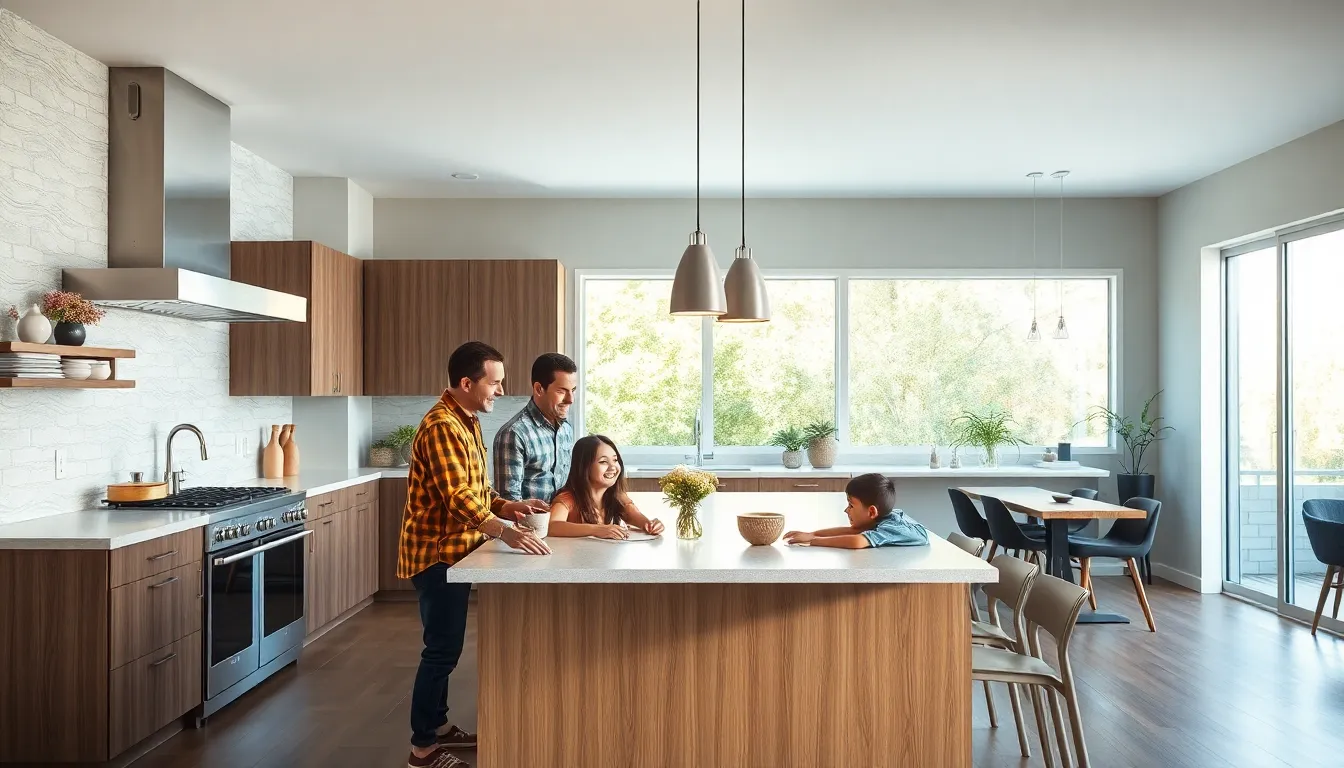Buying a house can feel like a game of Monopoly—exciting but also a bit terrifying. With so many options and decisions, it’s easy to get lost in a sea of open houses and “For Sale” signs. But fear not! A solid checklist can be your trusty sidekick on this adventure, helping you dodge pitfalls and make savvy choices.
Table of Contents
ToggleUnderstanding Your Needs
Understanding personal needs is crucial in the homebuying journey. Buyers must clarify what they truly seek to make informed decisions.
Budget Considerations
Budget considerations fundamentally shape the homebuying process. Start by determining an ideal price range for the home. Include additional costs like closing fees, property taxes, and insurance in the budget. A clear budget helps prioritize needs over wants. Evaluating financing options can uncover potential savings, so thoroughly examine mortgage rates and terms from various lenders. Establishing a budget makes the house-hunting process efficient, allowing buyers to focus on suitable properties.
Desired Location
Desired location significantly impacts lifestyle and convenience. Buyers should analyze factors like proximity to work, schools, and essential services. Considering neighborhood characteristics helps identify areas that fit personal preferences, such as safety and community amenities. Researching future developments can provide insight into long-term value. Evaluating public transportation options contributes to overall convenience. Prioritizing these location aspects ensures that the chosen home aligns with the buyer’s lifestyle and future goals.
Key Features to Evaluate

Evaluating key features in a home is crucial for making a smart purchase. Focus on specific elements that align with personal lifestyle and future needs.
Number of Bedrooms and Bathrooms
Consider the number of bedrooms based on family size and guest accommodations. Two to three bedrooms typically suit growing families. Assess bathroom count as well; homes with two or more bathrooms often provide better convenience. Prioritize features like en-suite bathrooms for added privacy and comfort. Evaluate how room sizes meet personal requirements. Room dimensions can significantly affect overall satisfaction.
Kitchen and Living Space
Allocate attention to kitchen layout and size. Open-concept designs foster connectivity between cooking and living areas, ideal for socializing. Check for essential appliances and sufficient counter space as well. Storage options in the kitchen greatly influence functionality. Examine living space characteristics next, ensuring ample room for relaxation and entertaining. Natural light creates an inviting atmosphere, enhancing overall home experience. Also, consider how the layout supports daily activities and family interactions.
Condition of the Property
Assessing the condition of a property is essential when buying a house. It influences overall investment value and potential repair costs.
Age of the House
Consider the age of the house. Older homes, typically over 30 years, may require more maintenance and updates. Inspecting systems like plumbing, electrical, and HVAC for outdated components becomes crucial. Many older homes possess unique architectural features that appeal to buyers. However, newer constructions often include modern materials and energy-efficient systems. Homes built within the last decade frequently offer lower maintenance and updated features. Prioritize houses that meet specific lifestyle needs while considering their age.
Structural Integrity
Examine the structural integrity of the property. Look for signs of foundation issues, such as cracks in walls or uneven floors. Roof age impacts longevity and potential leaks. Conducting a thorough inspection of basements, attics, and crawl spaces is essential. Pay attention to the materials used in construction, as certain materials degrade faster than others. Issues with the foundation or major structural components can lead to significant costs in repairs. Seek professional evaluations to gain a clear understanding of any underlying issues.
Neighborhood Analysis
Analyzing the neighborhood is crucial when buying a house. The surrounding environment significantly impacts lifestyle and property values.
Safety and Security
Safety remains a top priority for most homebuyers. Researching crime rates helps buyers understand the area’s neighborhood safety. Local law enforcement’s response time can also indicate how secure the neighborhood is. Speaking with residents offers insight into daily safety concerns. Many prefer neighborhoods with lower crime rates and community watch programs. Checking for street lighting and visibility enhances feelings of security, too. It’s advisable to assess how neighbors interact, as communities with engaged residents often promote safer environments.
Amenities and Services
Accessibility to amenities influences quality of life. Buyers should consider proximity to grocery stores, healthcare facilities, and recreational options. Public transportation options add convenience for commuting. Many look for parks, fitness centers, and cultural venues for leisure activities. Evaluating schools is critical for families, as reputable educational institutions enhance property values. Access to emergency services also plays a role in determining the neighborhood’s overall appeal. Hence, neighborhood amenities significantly affect daily living experiences and long-term satisfaction.
Final Considerations
When buying a house, a few final considerations remain crucial for making an informed decision. Each aspect can significantly impact the overall experience.
Home Inspection
A thorough home inspection serves as a vital step in the buying process. Inspectors examine the property’s condition, identifying issues that might not be visible to the untrained eye. Buyers uncover potential problems such as structural damage, plumbing issues, or electrical faults through these inspections. Investing in this process can save buyers from unexpected repair costs after purchase. Obtaining a detailed report highlights what may require immediate attention and what can wait. Prioritizing the inspector’s recommendations informs future maintenance decisions.
Resale Value
Considering resale value plays an essential role in the buying decision. A home’s location significantly influences its future marketability, with proximity to schools, parks, and shopping affecting desirability. Market trends also impact resale value; areas with rising demand may see increased worth over time. Evaluating the neighborhood for signs of growth or development projects can provide insight into future appreciation. Homes that incorporate energy-efficient features often attract buyers seeking lower utility costs. Understanding these factors enhances investment potential, ensuring a smart purchase decision.
Navigating the home-buying journey requires careful consideration and a strategic approach. By utilizing a comprehensive checklist buyers can ensure they cover all essential aspects of the process. Prioritizing personal needs and budget while evaluating property conditions helps in making informed decisions.
Understanding the neighborhood dynamics and potential resale value further enhances the investment’s appeal. A thorough home inspection is crucial to uncover hidden issues that could impact long-term satisfaction. With these factors in mind buyers can confidently embark on their search for the perfect home that aligns with their lifestyle and future aspirations.





